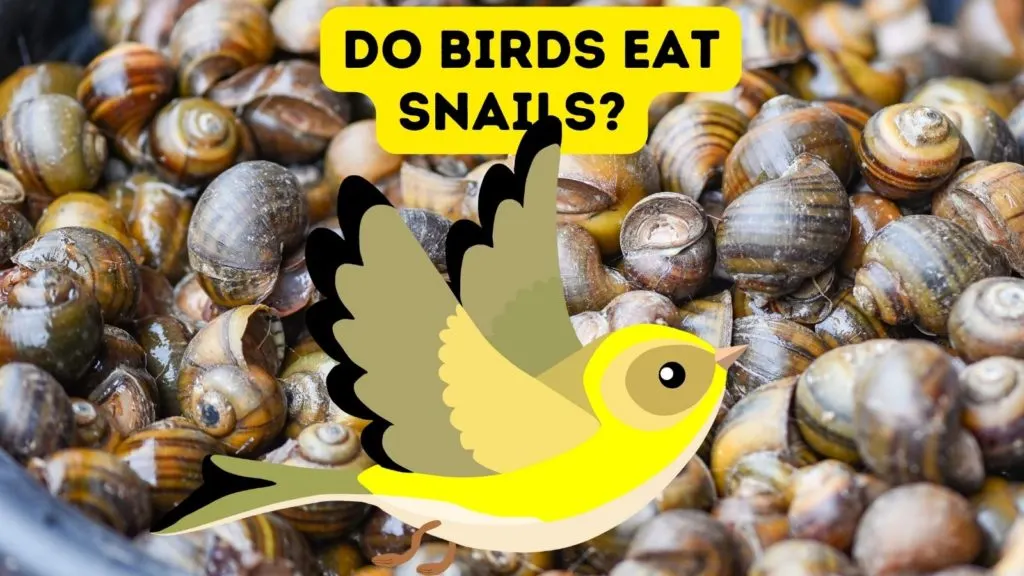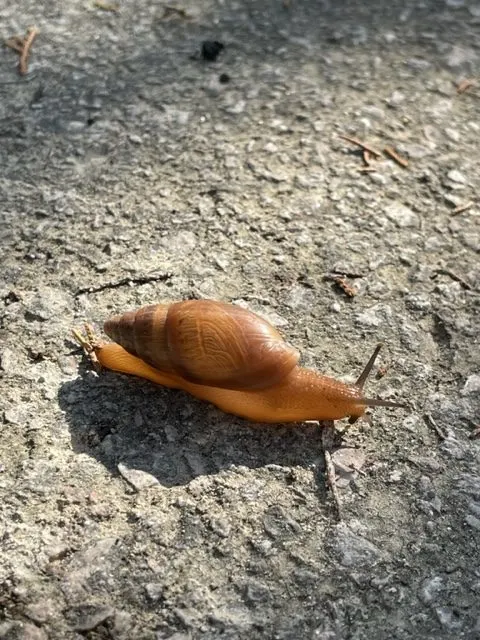It’s snail season here, thanks to recent rains. If you’ve noticed a bird eating a snail you just might be wondering if birds eat snails — or should they be eating snails and slugs?
Don’t worry; that bit of escargot is just fine for your backyard birds. Birds, with their varied diets, play essential roles in controlling pest populations, including those of snails and slugs. But there are some real dangers that birds face with a meal of snails. Let’s look at the types of birds that might be dining on snails in your yard and the risks that they might face.

Types of Snails and Slugs Eaten by Birds
The types of snails and slugs birds consume depend largely on the bird’s habitat and size. Garden snails and slugs are common targets due to their abundance in many environments where birds forage.
These include both terrestrial snails, which have a shell, and slugs, which are essentially shell-less snails.

Smaller snails are often eaten whole, while larger ones may be cracked open against rocks or hard surfaces by the birds to reach the soft insides.
These mollusks, often found lurking in gardens and moist habitats (or even right in the middle of the drive, like the snail I spotted this week, above), serve as a nutritious meal for certain bird species, providing them with a rich source of protein and minerals.
Birds That Eat Snails
Several bird species are known to feed on snails and slugs, including:
- Thrushes: Renowned for their method of smashing snails against rocks to break the shells, thrushes are perhaps the most famous snail-eaters.
- Blackbirds and Robins: These common garden visitors also partake in eating snails, especially smaller ones that they can consume whole.
- Ducks and Geese: Waterfowl may eat small snails they find while dabbling in mud.
- Gulls and Other Shorebirds: These birds often feed on marine snails along beaches.
These bird species have developed specific techniques to handle their shelled prey, showcasing an intriguing aspect of avian behavior and adaptation.
Risks of Birds Eating Snails or Slugs
While snails and slugs can be nutritious for birds, there are certain risks associated with these meals:
- Parasites and Diseases: Snails and slugs can carry parasites like the lungworm, which can be harmful to birds. Birds that eat these mollusks can become infected with diseases that might not only affect their health but can also lead to significant declines in bird populations.
- Pesticides and Chemicals: The most common risk to birds is one that we have direct control over: treating our lawns and gardens with pesticides. Snails and slugs that have ingested poisonous bait or have been exposed to pesticides pose a significant risk to birds. Consuming these tainted mollusks can lead to poisoning and death in birds. Try to keep your yard as natural as possible for the benefit of the birds and everything the birds come in contact with!
Help out the Birds with Natural Pest Control
Controlling snails and slugs in your yard without resorting to chemicals will be extremely beneficial to your visiting birds. Natural methods can be highly effective and sustainable. Here are several strategies to manage these mollusks:
Encourage Natural Predators
- Birds: Install more bird feeders and bird baths to attract birds that eat snails and slugs, like thrushes and blackbirds.
- Frogs and Toads: Create a garden pond or a damp shelter to attract frogs and toads, which are natural predators of snails and slugs.
- Ground Beetles: Preserve areas with leaf litter and logs to attract ground beetles, which feed on snails and slugs.
Barrier Methods
- Copper Tape: Place copper tape around the base of plants, pots, or garden beds. The copper reacts with the slime that snails and slugs secrete which deters them.
- Sharp Materials: Spread crushed eggshells, diatomaceous earth, or sharp sand around plants. The sharp edges deter snails and slugs from crossing over to the plants.
- Physical Barriers: Use raised garden beds or containers to make it more difficult for snails and slugs to reach the plants.
Manual Removal
- Hand Picking: Regularly inspect your garden in the evening or early morning, which are peak times for snails and slugs, and manually remove them. This method is time-consuming but very effective if done consistently.
- Trapping: Bury shallow dishes filled with beer at ground level. The yeast attracts snails and slugs, which then drown in the liquid. Alternatively, you can use inverted grapefruit halves or cabbage leaves as traps.
Cultural Practices
- Water in the Morning: Snails and slugs thrive in moist conditions. Watering in the morning allows the soil to dry by evening, making it less attractive to them.
- Mulch Wisely: While organic mulches can harbor snails and slugs, certain types like cedar bark are less inviting to them. Alternatively, use inorganic mulches like gravel or mineral-based products.
- Sanitation: Keep the garden free of debris, fallen leaves, and dense ground covers where snails and slugs like to hide during the day.
Attractant and Repellent Plants
- Repellent Plants: Planting herbs and flowers that snails and slugs dislike can help keep them away. Examples include lavender, rosemary, geraniums, and begonias.
- Attractant Plants: Use sacrificial plants or trap crops that attract snails and slugs away from your main garden. Once they congregate on these plants, you can remove them manually.
The diet of birds that includes snails and slugs reflects the complex interactions within ecosystems, where birds play a role in controlling snail populations, and in turn, must navigate the risks these prey may pose. Understanding these dynamics is crucial for bird conservation efforts, especially in managing the balance between protecting bird species and controlling snail and slug populations in gardens and agricultural settings.
More Posts You Might Like
- 8 Letter Bird Names - August 14, 2024
- 7 Letter Bird Names - August 14, 2024
- 7 Birds Named After Famous People - July 23, 2024
